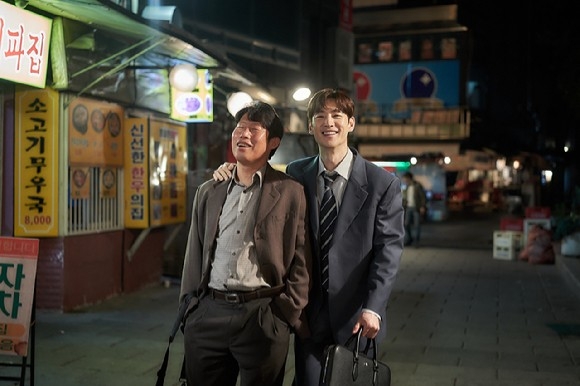- California Assembly OKs highest minimum wage in nation
- S. Korea unveils first graphic cigarette warnings
- US joins with South Korea, Japan in bid to deter North Korea
- LPGA golfer Chun In-gee finally back in action
- S. Korea won’t be top seed in final World Cup qualification round
- US men’s soccer misses 2nd straight Olympics
- US back on track in qualifying with 4-0 win over Guatemala
- High-intensity workout injuries spawn cottage industry
- CDC expands range of Zika mosquitoes into parts of Northeast
- Who knew? ‘The Walking Dead’ is helping families connect
(Movie Review) ‘Big Deal’: sobering take on work ethics goes beyond cutthroat M&A
On the surface, “Big Deal” appears to be a brutal merger and acquisition film set during the 1997-98 Asian financial crisis, inspired by a real-life story.
But at its core, it ultimately boils down to two men, who can’t have more different views and attitudes toward life, beginning to understand each other and developing an unexpected friendship.

In-beom (Lee Je-hoon), a smart analyst from a Wall Street investment firm, approaches Kuk Bo, a major South Korean soju company facing a severe liquidity crisis. He presents himself as wanting to help resolve their financial difficulties, and his seemingly friendly demeanor wins over Jong-rok (Yoo Hae-jin), Kuk Bo’s loyal CFO and long-time employee.
Beneath the surface, however, In-beom has a hidden motive: His ultimate goal is to acquire the struggling company, resell it for a substantial profit and, in doing so, prove himself in the fierce investment market.
For In-beom, a job is merely a means to make money, and the company he works for holds no significance beyond facilitating that. Working at an American company, he is also baffled by the local late-night drinking culture, where workers often drink the Korean distilled spirit soju until they are on the verge of passing out. To him, the workplace camaraderie built through these sessions feels like unnecessary extra work.
In stark contrast, Jong-rok represents Korea’s older generation, who dedicated their entire lives to work, contributing to the nation’s reconstruction after the devastation of the 1950-53 Korean War and its subsequent rapid industrialization. He prioritizes the company over everything else, to the extent that his wife and daughter have left him.
Despite their vastly different outlooks on life, the two men begin to slowly understand each other as they experience pivotal episodes that challenge their perspectives.
In-beom is outwitted by a Korean lawyer who lacks moral ethics and solely pursues money. Meanwhile, Jong-rok finds himself ignored and exploited by Kuk Bo’s Chairman Jin-woo (Son Hyun-joo), a second-generation chaebol head who cares little for employee welfare and is only interested in personal enrichment. These encounters help awaken them from their single-minded views.
Actors Lee Je-hoon and Yoo Hae-jin exhibit excellent chemistry in their first project together. Lee impressively delivers a vast majority of his lines in English while also skillfully portraying the subtle shifts in In-beom’s character as the story unfolds. As In-beom’s boss Gordon, Hong Kong American actor Byron Mann, known for his roles in “Jasmine” (2015) and “Dark Asset” (2023), injects a palpable sense of realism into the film’s depiction of a profit-driven investment firm.
Still, the film could have benefited from faster narrative development in its early stages. It spent too much time exploring characters whose opposing qualities came across as artificial and somewhat overdone.
Despite its pitfalls, the movie is likely to leave viewers with lingering thoughts about life. Whatever its title — be it “Soju War” (its Korean title), “Moral Hazard” (its working title), or the current “Big Deal” — the film invites them to contemplate one fundamental question: Why do you do what you do?
“Big Deal” opened in local cinemas Friday.












